Rose farming involves the cultivation of roses for commercial use. It can include growing roses for cut flowers and use in the production of rose oil and other products. Rose farming requires a significant investment in time, money, knowledge, a suitable growing environment, and a good variety of roses. The main steps in rose farming include selecting a site, preparing the soil, planting and caring for the roses, and harvesting and marketing the flowers.
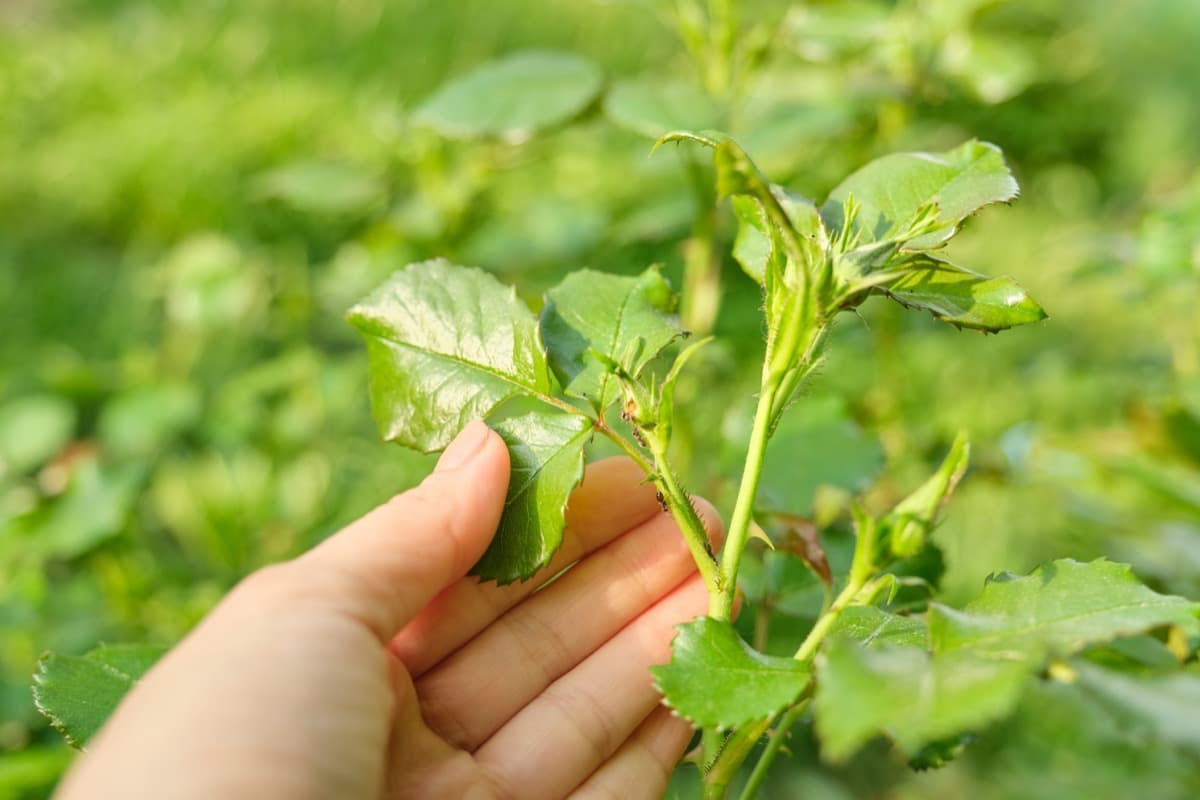
The farmer must know the different rose varieties, soil preparation, irrigation, pest management, and proper pruning techniques. The next task is pest management is an essential aspect of rose farming, as pests can cause significant damage to the plants and reduce the yield and quality of the flowers. Common pests that affect roses include aphids, spider mites, thrips, and Japanese beetles.
Aphids are little, soft-bodied insects that feed on the sap of rose leaves and stems, causing them to turn yellow and curl. Spider mites are tiny, eight-legged creatures that spin webs on the undersides of leaves and cause them to turn brown and die. Thrips are small, slender insects that feed on the petals and leaves of roses, leaving silver or brown scars. Japanese beetles are metallic green insects that feed on the leaves, flowers, and fruit of roses.
How to control Aphids on Roses
What type of aphids infests roses?
- Green peach aphid: This small, greenish-yellow insect feeds on many plants, including roses. They are usually found on new growth and buds and can cause distorted or curled leaves.
- Rose aphid: This is a small, reddish-brown insect specific to roses. They are usually found on new growth and buds and cause distorted or curled leaves.
- Rose leaf aphid: This small, greenish-yellow insect feeds on the undersides of rose leaves. They cause yellowing and curling of the leaves and a sticky residue on the leaves and nearby surfaces.
- Rose stem aphid: This small, reddish-brown insect feeds on the stems of roses, causing them to become distorted or stunted. They can also transmit diseases to the rose.
- Black bean aphid: This small, black insect feeds on the leaves and stems of roses. They cause distorted or curled leaves and transmit diseases to the rose.
In case you missed it: Earning 70 Lakhs from Rose Cultivation in 5 Acre Polyhouse: The Success Story of a Flower Farmer

How to identify aphids infesting the rose plant?
- Physical appearance: Aphids are small, soft-bodied insects ranging from green and yellow to brown to black. They are usually found on new growth and buds and can cause distorted or curled leaves.
- Sticky residue: Aphids excrete a sticky, sugary substance called honeydew, which can be found on the leaves and nearby surfaces. It can also attract ants.
- Damage to the plant: Aphids can cause yellowing, curling, or distortion of the leaves and buds, as well as stunted growth.
- Presence of predators: Aphids are a food source for many beneficial insects, such as ladybugs, lacewings, and parasitic wasps. If you notice an abundance of these insects on your rose plants, it could signify an aphid infestation.
- Inspection: A close examination of the rose plant is essential; check the leaves, flowers, and buds for aphids. They are usually found in clusters, especially in new growth and buds.
Home remedies to get rid of aphids on rose plants naturally
Water blasting to control aphids on rose plants
Water blasting is a simple and effective method for controlling aphids on roses. The vital force of the water knocks the aphids off the plants. It washes them away, reducing the population and preventing further damage. To use water blasting to control aphids on roses, you will need a hose with a high-pressure nozzle or a pressure washer. Here are the steps:
- Locate the infestation: Look for aphids on the new growth and buds of the rose plant.
- Adjust the nozzle: Set the nozzle to a high-pressure setting to ensure that the water blast will be strong enough to knock the aphids off the plant.
- Blast the aphids: Hold the nozzle a few inches away from the affected leaves and buds, and blast the aphids with the water. Be sure to aim at the underside of the leaves, as aphids often hide there.
- Repeat the process: Repeat the process every few days to ensure that any remaining aphids are removed.
- Monitor the plant: Keep monitoring the plant; if you see the Aphids returning, repeat the process or use other control methods.
In case you missed it: How to Grow Rosemary in USA: Soil, Propagation, Planting, Care, and Farming Tips
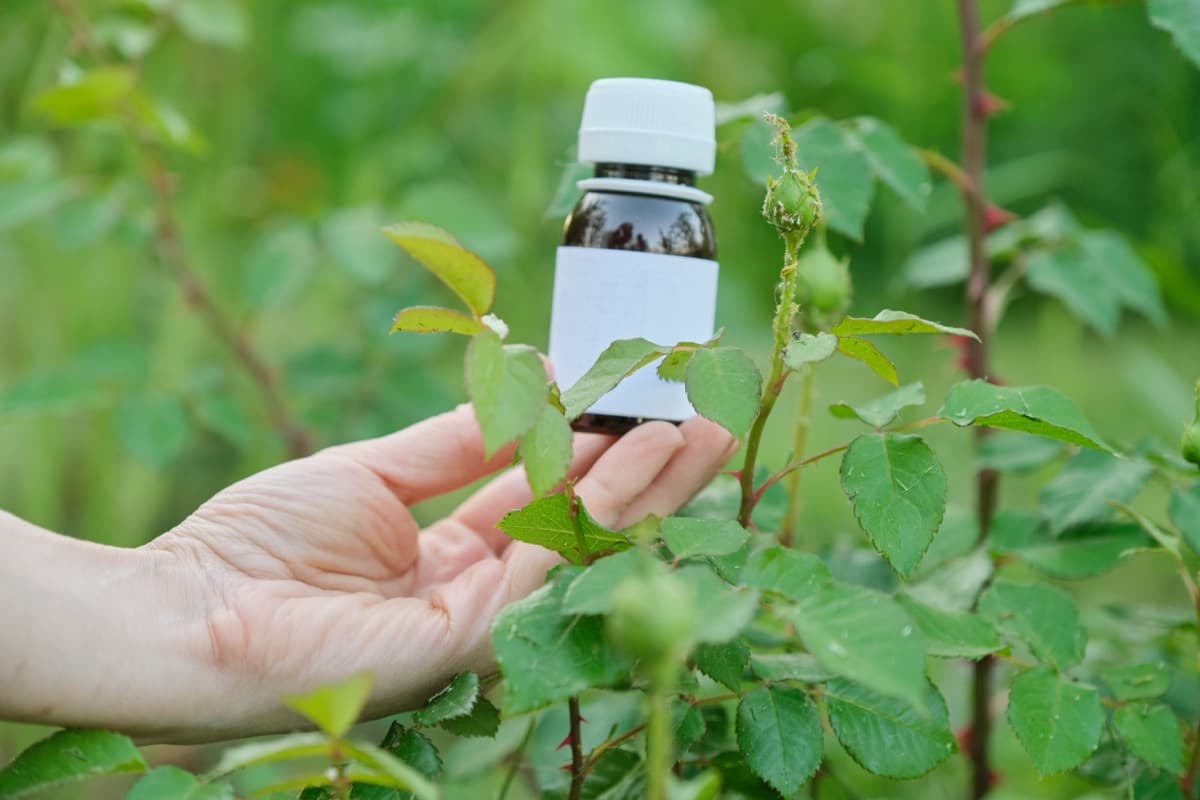
Soap spray to control aphids
A soap spray is a simple and effective home remedy controlling aphids on roses. The soap smothers the aphids and breaks down their protective waxy coating, making them more susceptible to predators. To make a soap spray for controlling aphids on roses, you will need the following:
- Dish soap (a few drops)
- Water (1 quart)
- Spray bottle
Steps to make and use a soap spray
- Mix the ingredients: Mix dish soap with water in a spray bottle. Shake the bottle well to combine the ingredients.
- Spray the affected areas: Spray the mixture on the rose plant’s affected leaves, buds, and stems. Be sure to aim at the underside of the leaves, as aphids often hide there.
- Repeat the process: Repeat the application every few days until the aphids are gone.
Neem oil spray to control aphids
Neem oil spray is a natural insecticide that can control aphids on roses. It works by suffocating the aphids and disrupting their ability to feed and reproduce. To make a neem oil spray for controlling aphids on roses, you will need the following:
- Neem oil (1 ounce)
- Water (1 quart)
- Spray bottle
- Spray adjuvant (Optional)
Steps to make and use a neem oil spray
- Mix the ingredients: Mix 1 ounce of neem oil with 1 quart of water in a spray bottle. If using a spray adjuvant, follow the manufacturer’s instructions for mixing the adjuvant with the neem oil and water. Shake the bottle well to combine the ingredients.
- Spray the affected areas: Spray the mixture on the rose plant’s affected leaves, buds, and stems. Be sure to aim at the underside of the leaves, as aphids often hide there.
- Repeat the process: Repeat the application every few days until the aphids are gone.
Garlic spray making to control aphids
A garlic spray can be an effective home remedy for controlling aphids on roses. Garlic is a natural repellent for aphids and has insecticidal properties. To make a garlic spray for controlling aphids on roses, you will need the following:
- Garlic cloves (5-6)
- Water (1 quart)
- Blender
- Strainer
- Spray bottle
In case you missed it: How to Start Rose Farming in the USA: A Step-by-Step Production Guide for Planting to Harvesting
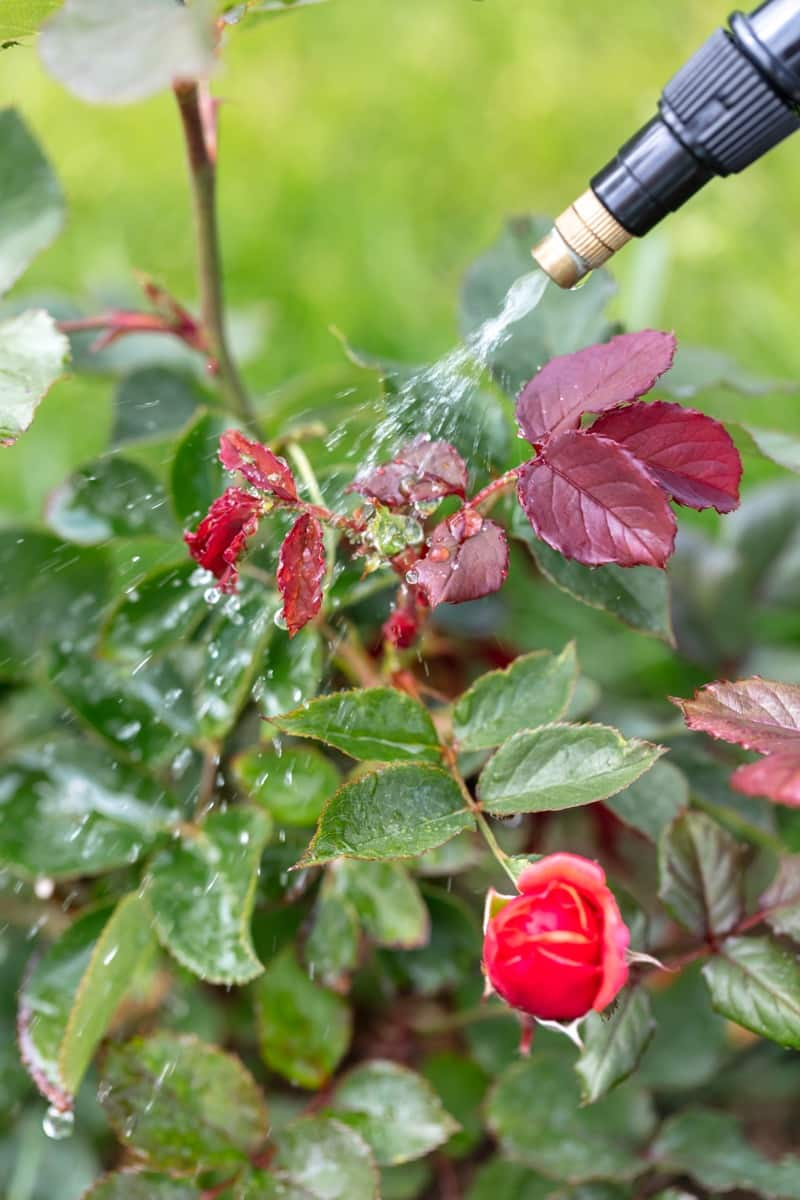
Steps to make and use garlic spray
- Make the garlic infusion: Peel and blend 5-6 cloves with 1 quart of water. Strain the mixture to remove any solids.
- Add the mixture to the spray bottle: Pour the garlic infusion into a spray bottle.
- Spray the affected areas: Spray the garlic mixture on the rose plant’s affected leaves, buds, and stems. Be sure to aim at the underside of the leaves, as aphids often hide there.
- Repeat the process: Repeat the application every few days until the aphids are gone.
- Monitor the plant: Keep monitoring the plant; if you see the Aphids returning, repeat the process or use other control methods.
Tobacco spray to control aphids
A tobacco spray can be used as a home remedy for controlling aphids on roses. Nicotine, an active component of tobacco, has insecticidal properties and can be toxic to aphids. To make a tobacco spray for controlling aphids on roses, you will need the following:
- Fresh tobacco leaves or cigarette tobacco (1 cup)
- Water (1 quart)
- Strainer
- Spray bottle
Steps to make and use a tobacco spray
- Make the tobacco infusion: Steep 1 cup of fresh tobacco leaves or cigarette tobacco in 1 quart of water for 24 hours. Strain the mixture to remove any solids.
- Add the mixture to the spray bottle: Pour the tobacco infusion into a spray bottle.
- Spray the affected areas: Spray the tobacco mixture on the rose plant’s affected leaves, buds, and stems. Be sure to aim at the underside of the leaves, as aphids often hide there.
- Repeat the process: Repeat the application every few days until the aphids are gone.
Vinegar spray to control aphids
Aphids are a common pest that can damage plants and reduce crop yields. One method for controlling aphids is to make and use a vinegar spray. To make a vinegar spray, you will need the following:
- White vinegar or apple cider vinegar
- Water
- A spray bottle
- (optional) few drops of dish soap
In case you missed it: Rose Farming Income, Cost, Profit, Project Report
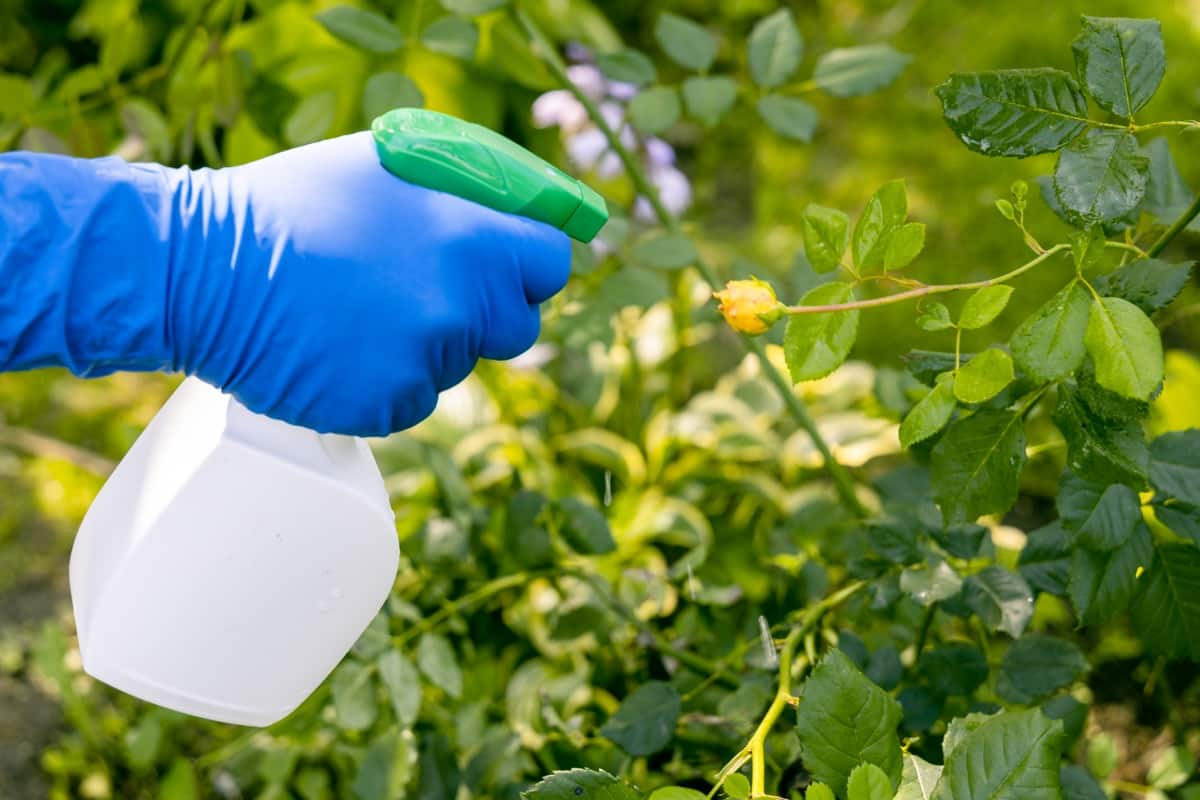
Steps for making a vinegar spray
- Mix 1 part vinegar with three parts water in a spray bottle.
- Add a 2-5ml few drops of dish soap to the mixture to help it stick to the leaves of the plants.
- Shake the mixture well to combine.
- Spray the mixture directly on the aphids and on the leaves of the plants where they are present.
- Repeat the application every 3-5 days until the aphids are under control.
Control aphids in rose plants with the cultural method
- Keep an eye out for early signs of infestation and deal with it immediately. Aphids reproduce quickly and can quickly become a significant problem if left unchecked.
- Keep the area around your rose plants free of weeds, which can provide a habitat for aphids.
- Provide good air circulation around your plants; this will help to dry the foliage and make it less hospitable to aphids.
- Avoid over-fertilizing your plants, as too much nitrogen, can lead to soft, succulent growth that is more appealing to aphids.
- Use a sticky trap to monitor the population of aphids in your garden. It will allow you to track their numbers and take action before they become a significant problem.
- Keep your rose plants healthy by providing them with the proper water, light, and nutrition; healthy plants are less likely to suffer from pests and diseases.
Control aphids in rose plants with biological method
A biological method for controlling aphids on rose plants involves using natural predators to control the aphid population. Some common natural predators of aphids include:
- Ladybugs: Ladybugs are voracious predators of aphids and can quickly reduce the population. They can be purchased from gardening stores and released into the garden.
- Lacewings: Lacewings are also effective predators of aphids and can be purchased and released into the garden.
- Parasitic wasps: Several species of parasitic wasps can help control aphid populations. They can be purchased and released into the garden.
- Predatory mites: Predatory mites such as Phytoseiulus persimilis and Amblyseius californicus feed on aphids and can be used to control populations.
- Minute pirate bugs: Minute pirate bugs are also effective predators of aphids and can be purchased and released into the garden.
Using a combination of cultural and organic methods, you can effectively control aphids on rose plants without resorting to harsh chemicals. Remember to be vigilant and address any infestations as soon as they are noticed.
In case you missed it: Key Rules to Start Fish Farming in Denmark: Business Plan, Breeds, Setup Cost, and Profit
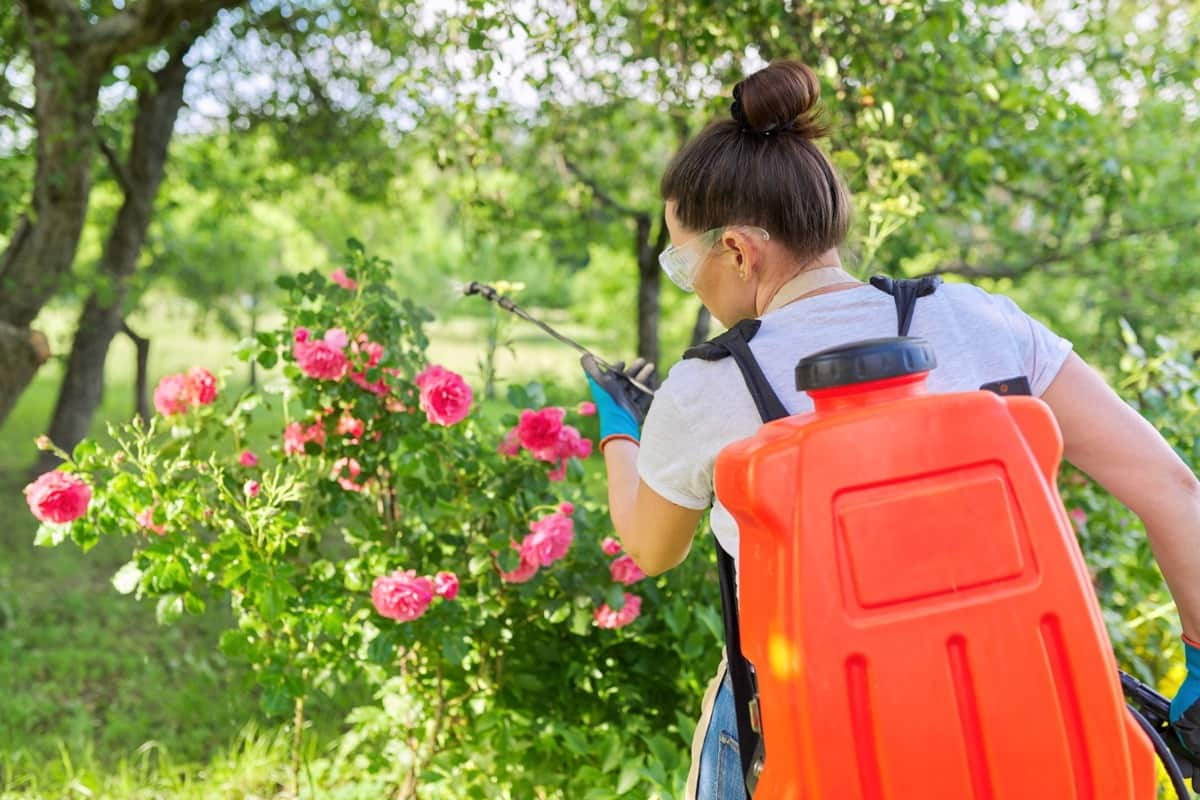
How to control aphids in rose plants with the chemical method
Aphids can be a common pest problem on rose plants, and chemical control methods can be used to reduce or eliminate them effectively. Here are some chemical control methods that can be used to control aphids on rose plants:
- Insecticidal soap: Insecticidal soap is a contact insecticide that can be used to control aphids. It works by suffocating the insects and disrupting their cell membranes. The soap solution should be sprayed directly on the aphids and the leaves of the plants.
- Neem oil: Neem oil is an efficient natural insecticide that can be used to control aphids. It disrupts the insects’ hormonal system, causing them to stop feeding and reproducing. The oil should be mixed with water and sprayed directly on the plants’ aphids and leaves.
- Pyrethrin: It is an insecticide produced from the blooms of chrysanthemums. It works by causing paralysis in the insects. It can be sprayed directly on the aphids and the leaves of the plants.
- Imidacloprid: Imidacloprid is a systemic insecticide absorbed by the roots and transported throughout the plant. It operates by interfering with the insects’ neurological systems. It is available in a granular form that can be applied to the soil around the base of the plant.
When using chemical pesticides, following the instructions on the product label and taking the necessary precautions to protect yourself and the environment is critical. It’s also critical to keep an eye on the plant and take action as soon as you see any signs of infestation.
Conclusion
Home remedies, such as using a strong stream of water to blast the aphids off the plants or using a mixture of water and dish soap as a spray, can be adequate for small infestations. Organic methods, such as using ladybugs, lacewings, or parasitic wasps as biological control, can effectively control aphids in the long term. Additionally, vinegar or neem oil spray can also effectively control aphids on rose plants.
Chemical control methods, such as insecticidal soap, neem oil, pyrethrin, or imidacloprid, can also effectively control aphids on rose plants. It is essential to follow instructions on the product label and take proper precautions to protect yourself and the environment. Ultimately, the best approach to controlling aphids on rose plants will depend on the specific situation and the severity of the infestation. It is essential to monitor the plants regularly, take action as soon as signs of infestation are noticed and use multiple methods for controlling aphids for the best results.
- Types of Pesticides Used in Agriculture: A Beginner’s Guide
- Economical Aquaculture: A Guide to Low-Budget Fish Farming
- 15 Common Planting Errors That Can Doom Your Fruit Trees
- How to Make Houseplants Bushy: Effective Tips and Ideas
- Innovative Strategies for Boosting Coconut Pollination and Yield
- Pollination Strategies for Maximum Pumpkin Yield
- The Complete Guide to Chicken Fattening: Strategies for Maximum Growth
- Natural Solutions for Tulip Problems: 100% Effective Remedies for Leaf and Bulb-Related Issues
- Revolutionizing Citrus Preservation: Towards a Healthier, Greener Future
- Natural Solutions for Peony Leaf and Flower Problems: 100% Effective Remedies
- Maximizing Profits with Avocado Contract Farming in India: A Comprehensive Guide
- Natural Solutions for Hydrangea Problems: 100% Effective Remedies for Leaf and Flowers
- The Ultimate Guide to Choosing the Perfect Foliage Friend: Bringing Life Indoors
- From Sunlight to Sustainability: 15 Ways to Use Solar Technology in Agriculture
- The Ultimate Guide to Dong Tao Chicken: Exploring from History to Raising
- The Eco-Friendly Makeover: How to Convert Your Unused Swimming Pool into a Fish Pond
- Mastering the Art of Delaware Chicken Farming: Essentials for Healthy Backyard Flocks
- 20 Best Homemade Fertilizers for Money Plant: DIY Recipes and Application Methods
- How to Craft a Comprehensive Free-Range Chicken Farming Business Plan
- Brighten Your Flock: Raising Easter Egger Chickens for Beauty and Bounty
- How to Optimize Your Poultry Egg Farm Business Plan with These Strategies
- Subsidy for Spirulina Cultivation: How Indian Government Schemes Encouraging Spirulina Farmers
- Ultimate Guide to Raising Dominique Chickens: Breeding, Feeding, Egg-Production, and Care
- Mastering the Art of Raising Jersey Giant Chickens: Care, Feeding, and More
- Ultimate Guide to Raising Legbar Chickens: Breeding, Farming Practices, Diet, Egg-Production
- How to Raise Welsummer Chickens: A Comprehensive Guide for Beginners
- How to Protect Indoor Plants in Winter: A Comprehensive Guide
- Ultimate Guide to Grow Bag Gardening: Tips, Tricks, and Planting Ideas for Urban Gardeners
- Guide to Lotus Cultivation: How to Propagate, Plant, Grow, Care, Cost, and Profit
- Agriculture Drone Subsidy Scheme: Government Kisan Subsidy, License, and How to Apply Online
- Ultimate Guide to Raising Araucana Chickens: Breed Profile, Farming Economics, Diet, and Care
- Bringing Hydroponics to Classroom: Importance, Benefits of Learning for School Students
- Ultimate Guide to Raising Polish Chickens: Breed Profile, Farming Economics, Diet, and Care
- Ultimate Guide to Raising Australorp Chickens: Profile, Farming Economics, Egg Production, Diet, and Care
- Silkie Chicken Farming: Raising Practices, Varieties, Egg Production, Diet, and Care
- Sussex Chicken Farming: Raising Practices, Varieties, Egg Production, Diet and Care